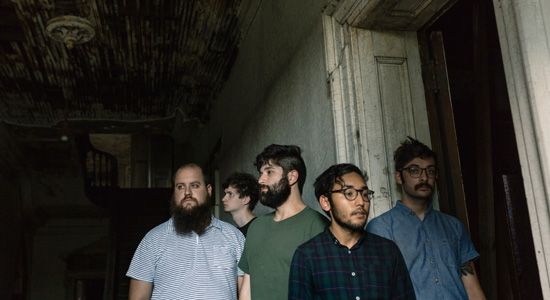
Growing up and branching out isn’t an albatross for the emo-punkers in Foxing
“We never set out to be any specific kind of band,” says Josh Coll. “So, when I listen to The Albatross, I hear things that are di fferent from what other people hear.”
The bassist and co-songwriter of St. Louis fi ve-piece Foxing is talking about its 2013 album, which is often fi led (along with the band itself) under emo/punk. Between its cathartic breakdowns, the howling delivery of vocalist Conor Murphy and frequent tour runs with scene faves the Hotelier and Brand New, it’s understandable why.
Coll, on the other hand, hears the sound of his old outfit Hunter Gatherer—an entirely instrumental act with post-rock leanings. He hears Murphy’s former crew Family Might, which was not instrumental, but had cinematic tendencies. Listen close to Foxing’s debut and those moments surface—on the turbulent and theatrical “Bloodhound,” for instance.
“The Albatross was a lot of us trying to find ourselves as a band in a very low-pressure environment,” says Coll. “We hadn’t played a show when we started writing the record. Nobody knew who our band was; nobody cared except for a handful of friends. In that regard, it was a lot of experimenting.”
Now, Foxing releases Dealer (Triple Crown), a follow-up that’s markedly more subdued, but also more exciting, bringing those scattered experiments into focus. Moments recall the tenderness of Sigur Rós, with Murphy’s delivery nuanced and melodic. His falsetto on “The Magdalene” is chilling, while the piano-driven “Night Channels” sees the band circling like a gathering storm out of Godspeed.
“I think that those elements were always there for us,” says Coll, citing an a ffnity for ambient and drone music. “It’s interesting sometimes, the di fference between what a band plays and what a band listens to.”
Recording and production of The Albatross was stretched out over nine months; Dealer, by comparison, was rocked out in a month. Coll calls it much more immediate, a space where their subconscious tendencies come through. “When you are writing for months and months on end, you have a lot of time to second-guess yourself and tweak things,” he says.
Where does that leave The Albatross? Coll admits to feeling burnt out after playing its songs nightly for two years. But they will always be there—slightly adapted thanks to touring violinist and synth player Emma Tiemann.
“Something as small as that breathes new life into your work,” he says.
—John Vettese






